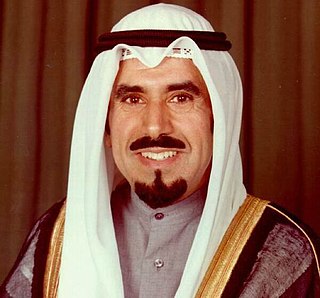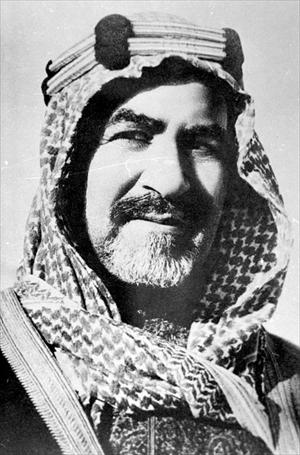
The Kuwait Armed Forces are the military forces of the State of Kuwait. They consist of the Kuwait Air Force, the Kuwait Army, the Kuwait Navy & the Kuwait National Guard. The governing bodies are the Kuwait Ministry of Defense, the Kuwait Ministry of Interior, and the Kuwait Fire Service Directorate. The Emir of Kuwait is the commander-in-chief of all defense forces while the Crown Prince is the deputy commander.

Sheikh Jaber Al-Ahmad Al-Jaber Al-Sabah or Jaber III was Emir of Kuwait from 31 December 1977 until his death in 2006.

The dynamic between the League of Arab States and the Islamic Republic of Iran has been ambivalent, owing to the latter's varying bilateral conduct with each country of the former. Iran is located on the easternmost frontier of the Arab League, which consists of 22 Arab countries and spans the bulk of the Middle East and North Africa, of which Iran is also a part. The Arab League's population is dominated by ethnic Arabs, whereas Iran's population is dominated by ethnic Persians; and while both sides have Islam as a common religion, their sects differ, with Sunnis constituting the majority in the Arab League and Shias constituting the majority in Iran. Since Iran's Islamic Revolution in 1979, the country's Shia theocracy has attempted to assert itself as the legitimate religious and political leadership of all Muslims, contesting a status that has generally been understood as belonging to Sunni-majority Saudi Arabia, where the cities of Mecca and Medina are located. This animosity, manifested in the Iran–Saudi Arabia proxy conflict, has greatly exacerbated the Shia–Sunni divide throughout the Muslim world.

The Embassy of the United States of America in Baghdad is the diplomatic mission of the United States of America in the Republic of Iraq. Ambassador Alina Romanowski is currently the chief of mission.

The Republic of Turkey (Türkiye) and the United States of America established diplomatic relations in 1927. Relations after World War II evolved from the Second Cairo Conference in December 1943 and Turkey's entrance into World War II on the side of the Allies in February 1945. Later that year, Turkey became a charter member of the United Nations. Since 1945, both countries advanced ties under liberal international order, put forward by the US, through a set of global, rule-based, structured relationships based on political, and economic liberalism. As a consequence relationships advanced under G20, OECD, Council of Europe, OSCE, WTO, the Euro-Atlantic Partnership Council, IMF, the World Bank and the Turkey in NATO.

In the years after the September 11, 2001 attack on the World Trade Center in New York City, Yemen became a key site for U.S. intelligence gathering and drone attacks on Al-Qaeda. According to the 2012 U.S. Global Leadership Report, 18% of Yemenis approved of U.S. leadership, with 59% disapproving and 23% uncertain. According to a February 2015 report from the Congressional Research Service, U.S. officials considered Al-Qaeda in the Arab Peninsula the Al-Qaeda affiliate "most likely to attempt transnational attacks against the United States."

Jordan has been a very close major non-NATO ally of the United States in the Middle East since 1996.

Qatar and the United States are strategic allies. Qatar has been designated a major non-NATO ally by the United States.

Diplomatic relations between Iraq and the United States began when the U.S. first recognized Iraq on January 9, 1930, with the signing of the Anglo-American-Iraqi Convention in London by Charles G. Dawes, U.S. Ambassador to the United Kingdom. The historiography of Iraq—United States relations prior to the 1980s is considered relatively underdeveloped, with the first in-depth academic studies being published in the 2010s. Today, the United States and Iraq both consider themselves as strategic partners, given the American political and military involvement after the invasion of Iraq and their mutual, deep-rooted relationship that followed. The United States provides the Iraqi security forces hundreds of millions of dollars of military aid and training annually as well as uses its military bases.
United States Security Assistance Organizations (SAOs) are U.S. government military and civilian personnel stationed in foreign countries to manage security assistance and other military programs. SAOs are closest to these programs' operation and have the closest contact with host-country militaries.

Iraq and Pakistan established diplomatic relations in 1947. Cultural interaction and economic trade between Mesopotamia and the Indus Valley date back to 1800 BCE. In 1955, both Iraq and Pakistan joined the Baghdad Pact, a military alliance against the Soviet Union. However, when the king of Iraq was assassinated in 1958, Iraq pulled out of the Baghdad Pact, which was subsequently renamed to the Central Treaty Organization (CENTO). During the Ba'athist era, relations were at times cordial and sometimes hostile. However, following the 2003 invasion of Iraq that toppled the Ba'athist government, bilateral relations have stabilized; Pakistan has supported Iraq in its fight against the Islamic State and other militant groups active in the Iraqi conflict. Iraq maintains an embassy in Islamabad while Pakistan maintains an embassy in Baghdad.

The relations between Iraq and Kuwait are longstanding and complex, experiencing many changes throughout recent decades.

Sheikh Ahmad Al-Jaber Al-Sabah was the tenth ruler of the Sheikhdom of Kuwait from 29 March 1921 until his death on 29 January 1950. He was the longest reigning ruler of Kuwait having reigned for a total 28 years and 305 days.

Kuwait and Iran have longstanding historical ties spanning hundreds of years, particularly in the pre-oil era. Relations were negatively influenced by the Iranian Revolution in 1979 and the Iran–Iraq War in the 1980s. Relations improved after the Iraqi invasion of Kuwait.
Pakistan Armed Forces deployments include all Pakistani military deployments that are stationed outside Pakistan and serving in other countries. The sixth largest military power in terms of active troops, Pakistan has an extensive history of overseas military presence, especially in the Middle East, where it has maintained military contingents, missions and battalions in several states. As part of its foreign policy efforts to expand its military relations and influence in the region, Pakistan signed defence protocols during the 1970s with several Arab countries including Saudi Arabia, Libya, Jordan, Iraq, Oman, the United Arab Emirates and Kuwait, under which members of the armed forces of these countries were imparted professional training by Pakistani advisers and military trainers. Saudi Arabia signed a bilateral agreement with Pakistan on defense cooperation; during that time, there were 50,000 to 60,000 Pakistani military personnel serving abroad with the largest number of these, about 20,000, deployed in Saudi Arabia.

Iran–Qatar relations refer to the bilateral relations between the Islamic Republic of Iran and the State of Qatar. Iran has an embassy in Doha while Qatar has an embassy in Tehran. Qatar and Iran have close ties.
The timeline of the Gulf War details the dates of the major events of the 1990–1991 war. It began with the Iraqi invasion of Kuwait on 2 August 1990 and ended with the Liberation of Kuwait by Coalition forces. Iraq subsequently agreed to the United Nations' demands on 28 February 1991. The ground war officially concluded with the signing of the armistice on 11 April 1991. However, the official end to Operation Desert Storm did not occur until sometime between 1996 - 1998. Major events in the aftermath include anti-Saddam Hussein uprisings in Iraq, massacres against the Kurds by the regime, Iraq formally recognizing the sovereignty of Kuwait in 1994, and eventually ending its cooperation with the United Nations Special Commission in 1998.

Historic and current bilateral relationship exist between Bahrain and Japan. Diplomatic relations were first established in 1972, and since then they have had increasing economic, cultural, and military cooperation, with Japan becoming one of the major trading partners of Bahrain. Several high-level official visits have taken place, including by King Hamad bin Isa Al Khalifa to Japan in 2012, Crown Prince Salman in 2013, and Prime Minister Shinzo Abe to Bahrain in 2013, with the governments of both countries expressing their intent to continue to increase their bilateral relations.

Sheikh Salem Abdullah Al-Jaber Al-Sabah is a member of the Kuwaiti royal family who served as Minister of Foreign Affairs from 2022 to 2023. He previously served as ambassador of Kuwait to the United States of America from June 2001 until May 2022.

As a country with traditionally strong contacts in the Arab world, Germany enjoys a good relationship with Kuwait. Among the EU states, Germany is Kuwait's most important trading partner.



















